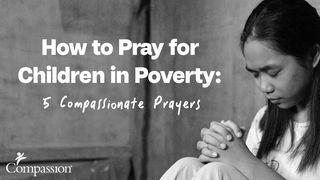Until Every Child Is Home - A 6-Day Devotional On Adoption And Foster CareSample

Jeff Dodge served as the teaching pastor at Cornerstone Church in Ames, Iowa, in Story County, from 1996 to 2019. By the end of Jeff’s ministry there, most of the families licensed by the Iowa Department of Human Services (DHS) in Story County were part of Cornerstone Church. Story County even held foster-care and adoption licensure classes at the church.
So many people were involved in that ministry that Jeff was hard-pressed to walk through the foyer on a Sunday and not bump into someone with foster care or adoption as a part of their story. Why did Cornerstone’s culture include such a robust orphan-care emphasis? It began with the pastoral staff.
They did not bring in a guest speaker or host a conference or preach a series of sermons on the topic. They personally began caring for vulnerable kids before the eyes of their watching congregation. On a short-term mission trip to Africa, one of the pastoral staff became burdened by the orphans he met there. He came home and did something about it. In short order, he and his wife pursued international adoption. As Jeff celebrated what God was doing in that family, he kept running into DHS employees in his town. Jeff and his wife, Teresa, learned that though Ames did not have visible orphanages like many countries in Africa, their community had an orphan problem. So in 2007, Jeff and Teresa enrolled in a DHS foster-care class. Cornerstone church had two pastors personally engaged in orphan care.
Over the years, Jeff and Teresa have taken in six different placements of children, including a couple of sibling sets. These kids enjoyed the same family structure, spiritual nurture, and church life that Jeff and Teresa provided their biological children. In time, the Cornerstone family began to follow the example of these pastors. The hallways, classrooms, and sanctuary of Cornerstone—like the living rooms and dinner tables of church members—have welcomed kids whose lives resembled a train wreck. Orphans are needy and hard and desperate for compassion. Who but the church could help? God used the Cornerstone church community to put some of these kids back on track. Some families have even shared the parenting responsibility. A family in their church adopted one of Jeff and Teresa’s foster placements.
What has motivated Jeff to stay engaged in orphan care even through difficult seasons? The Scriptures. Throughout the Old and New Testaments, God calls us to care for the more vulnerable in our communities, Jeff told me. “In Deuteronomy 24, Moses talks about this trio of needy people—the alien, the fatherless, and the widow—with the emphasis to take care of these groups,” Jeff told me. “Moses’ conclusion is, ‘Remember, you were a slave in the land of Egypt. That’s why I am commanding you these things.’ In effect, God says, ‘Don’t ever forget who you were when I found you—therefore take care of the most vulnerable in your community.’” The prophets repeat those commands, “and once again indict the people of God for their refusal to care for that same trio of the alien, the fatherless, and the widow,” he said. He referred to Jeremiah 7, in which the people were focused on the temple and ignored the needy around them. “Part of why Israel was sent into exile was because of their failure to care for this trio of vulnerable peoples.”
Then Jeff turned to the New Testament and reflected on the specific place of church leadership in orphan-care ministry. While many recognize the church as God’s means to care for orphans, who within the church might be equipped to personally take these children into their homes, giving orphans a nuclear family as well as connecting them with the resources of gospel-life in a local fellowship?
His answer: “Pastors need to lead by example. We have to be activists in orphan-care ministry, we can’t just lay heavy burdens on others to do what God has called His people to do,” he told me. “If we urge the congregation to act but don’t step out in front, we are at great risk before God, as well as being bad examples.” He recommends that leaders don’t simply roll out an orphan-care program, but they should enroll in a licensure class and take folks from the church with them! That seems like something Paul would say.
Paul, Timothy, and Titus—Leading by Example
In 1 and 2 Timothy and Titus, Paul emphasized the need for Timothy and Titus to follow his example so the church would in turn follow their example, thus providing the church with a general pattern of behavior. As Timothy and Titus modeled integrity in their spheres, the congregations under their care had observable patterns for practicing the faith. In Paul’s strategy, as the churches followed Timothy’s and Titus’s exemplary behavior, the gospel would be defended against those who oppose the faith. Though direct, personal orphan care is not specifically mentioned in Paul’s letters to these men, because orphan-care ministry is so challenging, it is the kind of ministry that leaders must exemplify if it is going to be done at all. And Paul had a lot to say about leaders setting an example for those whom they lead.
In 1 Timothy 4, Paul urgently exhorted Timothy to counter the deceptive spirit of the age by vigorously teaching Christian doctrine and exemplifying behavior consistent with it. Why? Because these churches faced opposition from apostates and false teachers—whose messages led to behavior that was inconsistent with the gospel, but whom many outsiders understood to still be associated with the church. If the watching world could not distinguish the behavior of the church from the behavior of those who might be associated with it in name only, the pure message of Christ would be compromised. Paul exhorted Timothy to set forth, train himself in, command and teach, read forth, and give himself to the gospel ministry. Weaved throughout these exhortations, Paul urged Timothy to “set the believers an example in speech, in conduct, in love, in faith, in purity” (v. 12), even to the degree that Timothy’s progress could be seen by all in the church (v. 15).
At the outset of 2 Timothy, Paul described his relationship with Timothy like that of a father and his son. Paul urged Timothy to continue in ministry despite opposition, because he and Timothy had together shared in God’s calling to salvation through the grace and glorious resurrection of Christ. Paul portrayed himself as one entrusted with this glorious gospel message (1:8, 11) and Timothy as one to whom Paul himself had entrusted the message of Christ. Paul commanded Timothy to set an example of endurance by holding “the pattern of the sound words” he had heard from Paul (1:13). The potency of the gospel message, Paul reminded Timothy, would supply Timothy with the spiritual might necessary to live an exemplary life for the church—even in the midst of great opposition. The enduring potency of the gospel was effective to set Timothy as a pattern of endurance for the church of his day, and it has the same power to enable leaders to exemplary living in our age.
Through statements like, “charge them in the presence of God” (2:14) and, “present yourself approved to God” (2:15), Paul urged Timothy to carry out his ministry for an audience of One. Paul called Timothy to be an example of God-centeredness for the church. In light of the false teachers’ and apostates’ love for more talk and less action, as Timothy concisely spoke the truth of the gospel, he would be a model of trust in God (3:17–18; cf. Num. 16:5). Paul charged Timothy to flee the youthful passions of debate and pursue righteousness, faith, love, and peace from a pure heart (2:22). Timothy’s truthful but peaceable ministry would establish an example for the church to be faithful with the Word of God while at the same time avoiding a reputation of zealotry and rebellion (2:23–24).
Jeff and Cornerstone experienced this, as do many churches committed to ministries like orphan care. “Unbelievers are stunned by what we have done by taking in kids whose lives are a mess,” Jeff told me. “Even if they think we are weird, right-wing evangelicals, they cannot deny the impact we are having for the good of our community.”
In the midst of the contentious atmosphere of the first-century church, leaders that demonstrated calmness and love in proclaiming the Christian message would stand out from their opponents and the antagonistic temperament of those disputing simply for dispute’s sake. By setting an example of truthfulness and humility, Timothy would be in a position to lead the church away from becoming a society of debaters and toward being a people eager to demonstrate their gospel convictions by doing good works in love and the Spirit. And the same rings true today. Though not all of my neighbors will listen to me defend the gospel in sermons, they are able to see me care for my adopted daughters just as I do my biological children. They see the kind of peacemaking and justice that result from believing the gospel of peace.
Though Paul was concerned about what might lie ahead for followers of Christ, he did not call Timothy to retreat or compromise. Rather, in accord with his command for Timothy to hold fast the sacred message of the gospel, Paul reminded him in 2 Timothy 3:10–11 that his own apostolic ministry had been marked by endurance of suffering even since the days before he met Timothy. Paul’s reference to the cities of Antioch, Iconium, and Lystra would have brought back memories of the time when Paul’s opponents stoned him and left him for dead (Acts 14:19–20)! Ultimately, however, Paul called Timothy to root his ministry in the pattern of life established by Jesus Himself (2 Tim. 3:15–16).
Themes of battling for the truth of the gospel in 1 and 2 Timothy and Titus are sometimes emphasized over Paul’s exhortations for the church and its leaders to live peacefully. The theme of peace dominates 2 Timothy 2 and Paul’s mindset in his letter to Titus. When Paul wrote to Titus, Titus was working on the isle of Crete—dominated by lazy and deceptive religious talkers. Against this backdrop, Paul was concerned for Titus to set an example of truthful speech and loving service for the church under Titus’s watch.
Throughout his letter to Titus, Paul emphasized the need for the Cretan church to do good works. And in the midst of addressing various subgroups of the church in Titus 2, Paul directed attention specifically to Titus: “Show yourself to be an example of good deeds, with purity in doctrine, dignified, sound in speech which is beyond reproach, so that the opponent will be put to shame, having nothing bad to say about us” (vv. 7–8). Titus’s exemplary behavior, empowered by the grace of God in Christ and the presence of the Spirit, would serve to guide the church’s response to the culture of depravity on Crete.
You've been reading excerpts from Todd Chipman's book Until Every Child is Home. To purchase the book and continue your journey in orphan-care, go to moodypublishers.com.
Scripture
About this Plan

In this 6-day devotional, you'll discover God's heart for orphan-care through the Scriptures and stories of men and women who have devoted themselves to the pure religion of caring for widows and orphans.
More
We would like to thank Moody Publishers for providing this plan. For more information, please visit: https://www.moodypublishers.com/books/current-issues/until-every-child-is-home/
Related Plans

Ready or Not for Foster & Adoptive Families

Start with Yes- A 5 Day Foster Care and Adoption Reading Plan

Every Child Deserves a Family: Praying for Orphans

Battle-Weary Parents for Parenting in Crisis

The Greatest Secret: How Being God's Adopted Children Changes Everything

Belongings

Prayer Walk A Campus

How to Pray for Children in Poverty: 5 Prayers

Brand New
